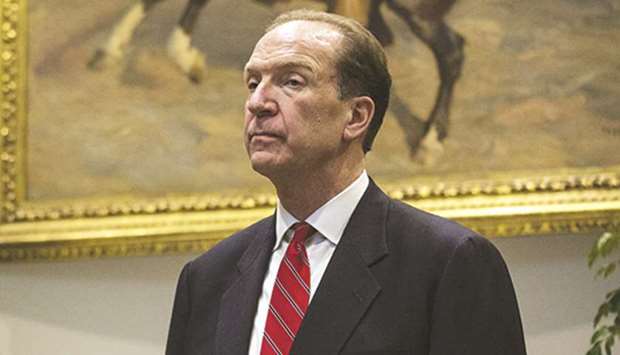The US is encountering little opposition to its candidate to head the World Bank, as other countries look to avoid a bruising public battle with the Trump administration, according to people familiar with the matter.
President Donald Trump this week nominated senior Treasury official David Malpass to become the bank’s next president. In his opening pitch for the job, Malpass has sought to dispel the notion that he’d seek radical changes, casting himself as a moderate reformer who would keep the development lender focused on its mission of helping the world’s poor.
The bank’s executive board, which represents 189 member countries, aims to make its choice by mid-April. Members have until March 14 to put forward candidates, and a challenger could still emerge against Malpass, a former Bear Stearns economist and a fixture at global economic summits. One potential rival could be former Nigerian finance minister Ngozi Okonjo-Iweala, who has said she’ll run if nominated.
While Malpass’s confirmation isn’t yet a lock, finance ministries outside the US are inclined to support him, according to three people briefed on the matter who spoke on condition of anonymity because the discussions aren’t public.
“He’s a known quantity in the international community,” said Daniel Runde, director of the project on prosperity and development at the Center for Strategic and International Studies. “The other shareholders should get behind the American candidate now.”
Malpass is being lined up to replace Jim Yong Kim, who resigned last month to join an investment firm. If approved, he’d likely serve a five-year term, stamping a Trump imprint on the global economic agenda that could outlast his presidency.
Conceived during World War II to finance the reconstruction of Europe, the World Bank now focuses on fighting extreme poverty around the world, lending tens of billions a year.
Under an informal pact with Europe, the World Bank has always been led by an American, while the managing director of the International Monetary Fund is European.
Some experts say it’s time to appoint a non-American in recognition of the growing clout of emerging markets such as China and India. But European governments may be reluctant to break the tradition — out of fear they’ll then have to concede leadership of the IMF when Managing Director Christine Lagarde steps down. Her term ends in 2021.
Kim was appointed to succeed Robert Zoellick in 2012. That year, Kim beat out Okonjo-Iweala and Jose Antonio Ocampo, a former finance minister of Colombia whose main supporter was Brazil. But Brazil’s new right-wing President Jair Bolsonaro has exchanged praise with Trump, raising doubts about whether he’ll challenge the US grip this time.
Russia is signalling it won’t object to Malpass. “On debt sustainability for developing countries, he’s a strong advocate for bringing some order,” Russian deputy finance minister Sergey Storchak told reporters this week.
Malpass said on Thursday that his nomination had been “well received” by other countries, though he didn’t cite specific endorsements. He’s embarking on a global tour to press his case, starting in China and Japan this month.
In the past, Malpass has portrayed the World Bank as outsized, inefficient and reluctant to scale back lending to developing countries that succeed in turning themselves into dynamic emerging markets. He echoed Trump’s doubts about international cooperation, declaring in 2017 that multilateralism has strayed “substantially too far” from free- market principles.
“Malpass is known for his antagonism toward the institution and its core objectives,” wrote Cornell University trade professor and former IMF economist Eswar Prasad in a Washington Post op-ed.
In an interview with Bloomberg Television, Malpass said he cares “deeply about the mission of the World Bank.”

Malpass: Moderate reformer.
